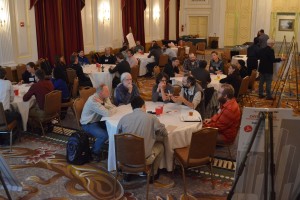
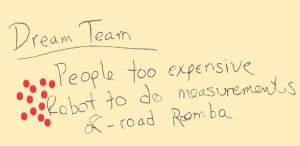
At the 2015 Ameriflux Principal Investigators Meeting in Washington DC, 35 people participated in a World Cafe session to brainstorm about the Next Big Ideas in climate research. Below are listed the primary themes that emerged from discussions.
Tables
Three rounds of discussion were held at each table. At the end, participants used dots to indicate favorable ideas. See images at the end for table notes, and dot voting.
Here are the themes that emerged:
Table A: Improve sensing, processing, analysis and communication
Table B: Use rich media to communicate about science; Advance the science
Table C: Use visualization to increase understanding and meaning
Table D: Make IT more user friendly
Table E: Automate fieldwork
Images:
Table Notes and Dot Voting
Table A
Theme: Improve sensing, processing, analysis and communication
Sensing and data:
- Study weather via more sensors and drones
- Monitor restoration
- Use the cloud to store data
Processing and analysis
- Data assimilation
- Improve techniques to better understand photosynthesis, carbon budget
- Adapting to change
- Soil/atmosphere interactions
Communication (Make it meaningful):
- Story telling
- Operational/informative approach to carbon monitoring
Table B
Themes: Use rich media and narrative to communicate about science; advance the science
Rich media:
- Make carbon sums accessible to public
- Using visualization, sound and animation to see and think about our sites in new ways
- Data at your fingertips/PECAN (https://pecanproject.github.io)
- Advanced visualization
- Breathing of biosphere
- Story telling
- PEcAn / Citizen Science
Advance the science:
- Need new models to understand water fluxes
- Use drones to measure canopy reflectance
- Canopy analysis via drones
- 14C below ground
- Sensors: Some don’t exist
- Hyperspectral LIDAR
- Stoichiometry
- Sonar
- New GPP measures, O2
- Better resolution. Near-scale carbon budget
- Better computing / uniform BADM
- New measurements to understand air drainage, canopy structure and biomass
- Ecologist in a box
- Soil data at different scales
- Remote sensing of soil
Question: How can AmeriFlux benefit from high performance computing?
Table C
Theme: Use visualization to increase understanding and meaning
We need more Randy Olsons: Computer scientist / Artist / Scientist who can translate across disciplines
Dream team:
- Soil scientist in a cloud
- Computer scientist / Artist / Scientist who can translate across disciplines
- Flux tower PIs
- Economist
- Actuary, Randy Olson (convince people it is important), tech wizard, CS/data manager/phenologist, modeler, soil scientist, physiologist, funding agent
Table D
Theme: Make IT more user friendly
Needs:
- Data input tool that can read and interpret anything (CSV, images, text, time sequence, etc.)
- IT that makes data automatically queryable
- Data repository tool for better data sharing
Dream team:
- Lobbyists
- Geo-visual analytics
- Anthropologists (talk to humans), psychologists, engineers, modelers, ecologist
Table E
Theme: Automate fieldwork
Ideas:
- Study allocation of belowground carbon
- Help define carbon budget
- Implement in model
- New models based on import from Landsat
Automate fieldwork:
- People are too expensive
- Robot could perform rote, repeated measurements
- Off-road Roomba
Images: Table Notes and Dot Voting
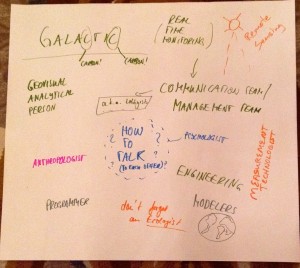
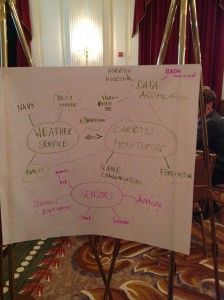
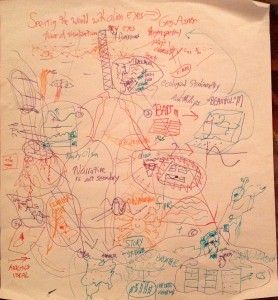
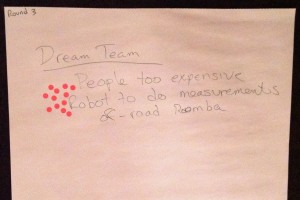
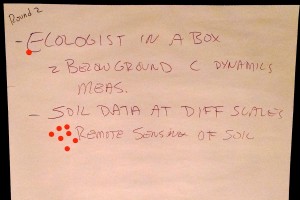
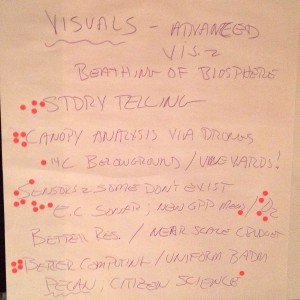
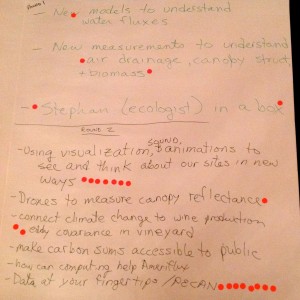

No Comments
Be the first to start a conversation